
Everyday situations at work are an invaluable source of inspiration for most of our lessons here at Small Revolution School, especially in Successful Behaviour & Habits for Virtual Assistants.
In particular, those not-so-shiny examples from which you can learn a lot and hopefully avoid making the same mistakes once you start your online career.
This one’s no exception!
Let’s get straight to the point and share our precious insights with you. Here’s what it’s all about.
In the past few months, we’ve had new people join our remote team. Every time a new person joins us, we send them a “Welcome to the Team” email, which contains comprehensive and precise instructions for:
- Payment methods and processes
- Job roles and descriptions
- Our project management system
- Password managing software
- Common daily habits such as virtual office courtesy, recording the time and managing their timesheets, providing reports and valuable inputs for the tasks, basic communication rules, work ethics, and the like
That initial email includes additional links to ALL our instructions for doing the tasks at hand. Just like many other online businesses, we have a large team who are spread all around the world.
That’s why it’s important that we all use the same processes to manage our work. This results in a streamlined business and better communication.
Our aim is to get a new team member started working with us as quickly and seamlessly as possible.
Now, you may think what the problem is. We provide people with detailed guidelines and are always there to assist them at the beginning of their exciting online journey.
Well, it can get unexpectedly complicated at the receiving end of the message, you know?
Even the best-crafted guidelines in the world mean absolutely nothing if the ones they’re meant for don’t pay due attention to them. Don’t you think so?
To make sure you won’t overlook this potential problem and let it ruin your prospective online career, we decided to share out true story with you.
We hope you’ll use these precious insights to your advantage and avoid making the same mistakes you’ll see in the next subsection. Ready?
Learn From Other People’s Mistakes
So, here’s what happened to us once.
Two out of three new team members did NOT bother to thoroughly read the instructions related to our standard work processes, in-house rules and their tasks. Therefore they were both really difficult to work with and made many mistakes.
Guess what! It drove the employer crazy, and it was extremely annoying for the whole team, too, as you’ll see from their reactions down in the lesson. What’s more, it hindered the team’s communication and work in progress at that time.
Here are several genuine examples excerpted from messages exchanged only between two team members within the trial period for one of them. This person had similar conversations with the other team members, as well.
The following messages prove how annoying neglecting the SOPs can be and further illustrate what we’re talking about.
Example 1

This is the first reminder to a new team member that he should always refer to the instructions and follow the standard procedures explained there when working on particular tasks after he neglected the instructions a few times. And of course, a bit of support and understanding since it was his second week at work.
Example 2

Four days later the same new colleague receives the second reminder from the same co-worker with whom he closely collaborates.
Example 3
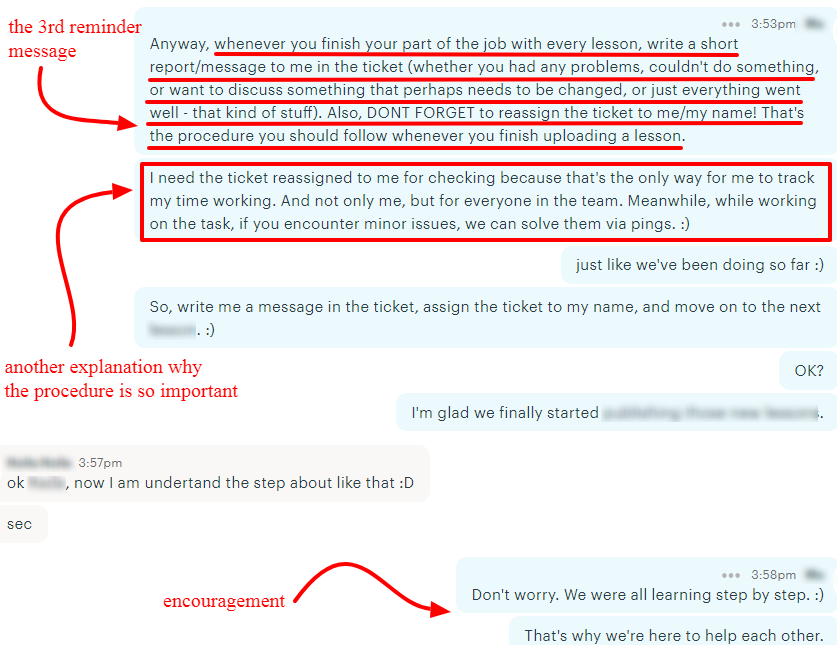
This guy kept ignoring the working procedures, so some 15 days later, he received the third reminder accompanied by a short explanation why sticking to the rules is so important just in case he hadn’t properly understood it at the beginning. The other colleague was pretty direct and clear but still remained supportive.
Example 4
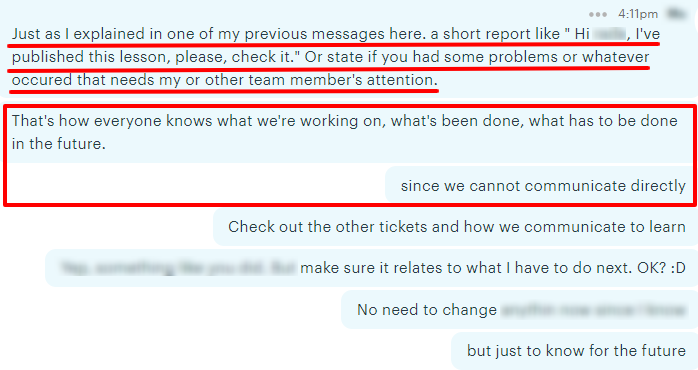
Sometime later, again the same situation and the fourth reminder with another explanation was sent to the new colleague. This time, it started becoming really annoying as you can probably notice.
Example 5

Apart from completely neglecting the team’s standard work procedures, the same person kept making many other mistakes such as, for instance, asking copywriters or virtual assistants questions which should be within a web developer’s domain.
What’s wrong with asking questions while learning? Nothing! We even encourage it! As long as you know whom to address and how to ask, but it will be the topic in one of the subsections to come.
This continual blunder showed us that he hadn’t read the detailed job descriptions initially and had absolutely NO clue what was expected from each of us.
Those descriptions were part of some other relevant documents he was supposed to fully understand prior to starting work, which means he probably hadn’t taken a look at them, too.
Example 6
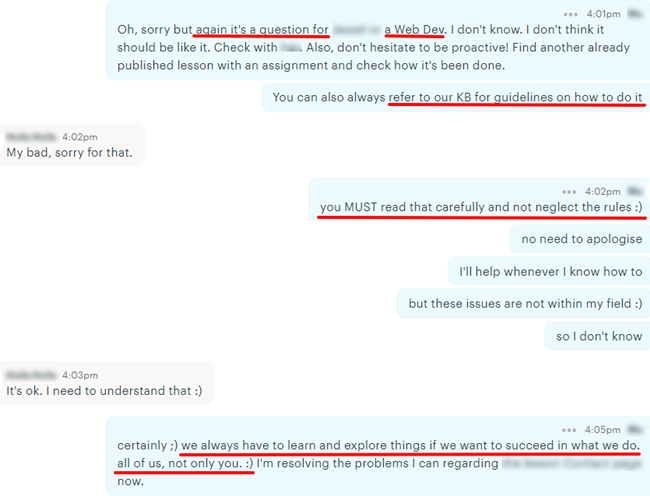
And a week later the same scenario again. With another reminder what should be done and encouragement to the newbie to take initiative along with a suggestion which way to go. He apologised but did nothing at all to change his attitude and improve his work, which was all he was expected to do.
Example 7
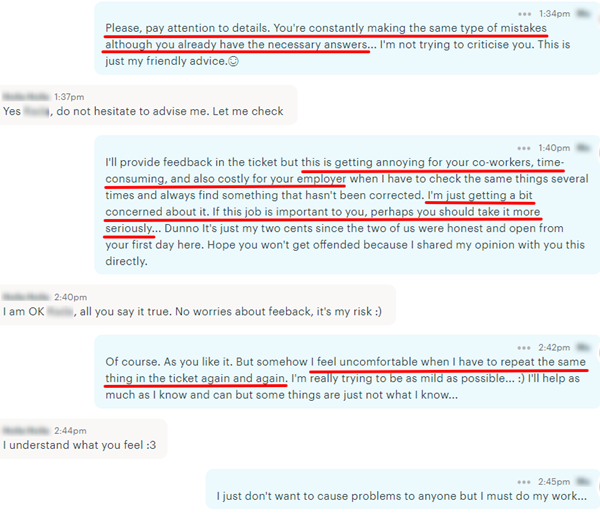
Some 10 days later. Guess what – nothing changed! Actually, it started seriously affecting other people’s work and getting on everyone’s nerves, so the feedback became pretty direct.
The others who cooperated with this person started to feel bad because they constantly needed to send him negative feedback and reminders about the job essentials.
Example 8

Needless to say, two weeks later nothing changed.
When you’ve seen all this, would you like to be such a person in your future online team? We doubt anyone would want it!
However, we understand what is at the root of the matter.
What Usually Causes the Problem?
When students get their first online job, they’re usually super excited, which is totally understandable. We’re excited about your success, too!
Similarly, most people are simply nervous when they start a new job and they just want to get going. They’ve got lots of energy and are firing on all cylinders.
That’s exactly what happened to our new colleagues.
WARNING: This ‘nervous’ energy is NOT helpful. It leads to mistakes. It makes you jumpy instead of solid.
Therefore, calm down and read all the instructions carefully. It’s a prerequisite for a good start of a prosperous online career.
That’s how you’ll avoid getting the same negative feedback day after day, like this:
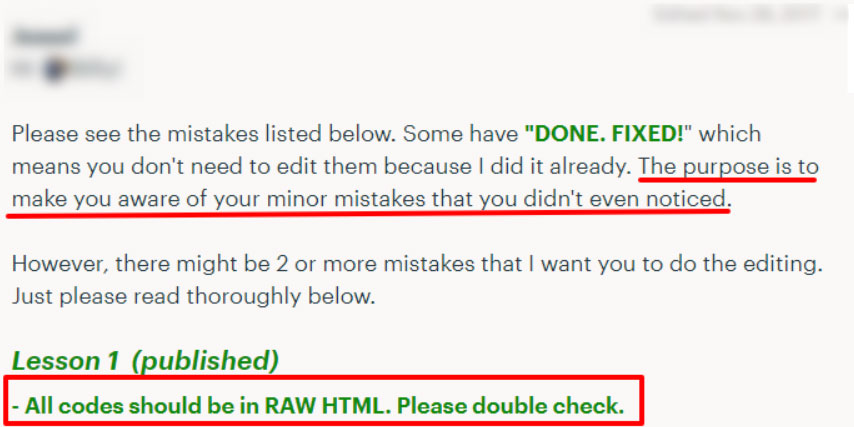
And again:

And again:

Can you imagine the colour of this colleague’s face changing from a regular one, over green to red along with the letters they picked to deliver the feedback?
Honestly, wouldn’t you be annoyed whether you constantly needed to send or receive messages like these?
It’s difficult to remain direct yet tactful.
Unquestionably, no one feels comfortable in such a situation. So, just pull yourself together.
Getting excited is OK, but growing wildly excited and extremely nervous can cost you the job.
Yes, you’ve seen it right!
When you’re nervous, you lose your focus, which causes numerous mistakes. That seriously affects your performance, and poor performance often leads to the end of your contract. Got it?
The only way you can overcome this problem is to:
- Calm down
- Go through all the instructions you get
- Pay attention to every single detail
- Ask questions when you need help
However, this leads us to another possible problem – asking stupid questions.
Yeah, we know… Now, many of you will say that there’s no such thing as stupid questions, right? Are you 100% sure, though?
Let’s see…
Is There Such a Thing as a Dumb Question When You’re New to an Online Team?
When you work remotely for years or even decades, over time you realise that there ARE dumb questions newbies usually ask. Lots of them, unfortunately.
Sorry if we disappointed you, but we’re talking from our extensive experience. And you’ll probably agree with our point when you see it explained.
Here’s the thing – people ask dumb questions when they haven’t read the instructions.
In case you’ve wondered how your colleagues will know whether you read all the instructions carefully or not, you’ve just revealed the secret.
Let us further illustrate this.
When working as a young cook in a famous restaurant and being given the task to bake a cake, you wouldn’t generally ask ‘How do I bake this cake?’ but you’d probably be more specific and ask e.g. ‘Do you bake this cake at 180℃ or at 200℃?’
You see?
Similarly, imagine you’re hired as a trained Web Developer and provided with detailed guidelines on how to upload content onto your employer’s website.
When you start working a bad question would be, for instance:
How do I upload this blog post?
Why? Because it’s too general implying you have no idea how to do your job. It requires a lot of time and energy from your supervisor to explain everything over and over again.
Instead, a good question would be more specific. So, your message should be something like this:
While uploading this content, I came across [issue]. Here’s how I tried to resolve it [the action you took towards the solution]. Just wanted to check with you whether this is the way to go or there are other better ways.
You see the difference in the approach? Certainly.
The first one seems completely uninterested and lacking depth, whereas the second one shows the person is proactive and has already put considerable effort into providing a solution to the problem. That’s what every employer appreciates and expects!
No one minds if a person asks good questions. Questions are great when they show that you have extended your thinking!
On the other hand, it makes a bad impression if a new person constantly asks stupid questions.
The solution is simple again. It all boils down to reading the signs and paying closer attention. So, read the instructions.
Calm down and read slowly. If you slow down, then you’ll calm down and think clearly. No one thinks clearly if they’re rushing or not calm, right?
So, what are the best steps you should take to make sure you’ve read everything properly?
Here are some of our suggestions.
1: Read Until You Fully Understand and Can Follow the Instructions
Read the instructions once. Read them twice. Read them 50 times if necessary.
Have we mentioned you should always read all the instructions you get especially before you start working on a task or project? Then, while you’re doing the task. And after you’ve finished it.
Yes, always and all the time! That’s the easy way out of a possible problem.
Attentive reading and asking specific questions in written communication equal active listening in speaking.
Of course, employers are aware that a new employee is impatient to get started and earning money and that they’re feeling nervous.
It’s not that employers think people won’t read the instructions at all.
On the contrary. They read the instructions, but their brain is somewhere else and feeling nervous so they miss lots of crucial information, as we’ve previously explained.
Read the instructions twice or as many times as you need until you’re 100% certain that you totally understand everything and can follow the steps to get the work done. Just go carefully and slowly and take a few notes. Also, focus on one task at a time.
You’ll make a better first impression because you won’t bother anyone unless you really cannot solve a problem on your own. Also, you’ll avoid blunders and prove yourself as a professional and valuable team member.
Thus, even when you’ve read the guidelines before starting your work and you think you’ve done everything right, it’s always a wise decision to check everything just in case.
2: Always Double-Check Your Work Before Submitting It
Employers and team leaders set tasks and provide instructions. Your job at the very beginning will be to follow them and complete your tasks.
But, don’t forget–before you reassign the task or say “I’ve finished“, always double-check your work by reading the instructions again.
Did you miss anything small in the instructions? Did you provide the outcome that the employer asked for? Go over your work and check for any small errors.
Make sure you don’t let sloppy mistakes persist because it not only leads to failure but maybe even more importantly, leads to mistrust.
After all, if you can’t trust what your teammates are doing, you can’t rely on them. And if you can’t rely on them, you’re either doing all their work again (to verify it), or unwilling to work in a team. Neither of those leads to a high performing team as noticed in the article Smart People Double Check Their Work.
When you think of ‘sloppy work’, you might imagine tasks performed in a careless or lazy way, documents that are full of mistakes, or actions that show no regard for team goals and objectives.
‘Sloppy work’ can also apply to conversations and work relationships. For example, people can demonstrate a lack of attentiveness when they make careless comments to clients.
Sloppy work can damage a person’s career, a team’s morale, and even an organisation’s success according to the author of Dealing With Sloppy Work.
You can also benefit from referring to these blog posts:
- Check That: A Simple Way to Ensure Accurate Results
- How to Control or Avoid Errors in your Work: 15 Awesome Tips
- How to Improve Attention to Details at Work
- How to Become More Detail-Orientated & Efficient at Work
Your teammates will be grateful for revising your work because you’ll save a lot of their precious time and energy this way. Make sure your carelessness doesn’t trigger messages like this:
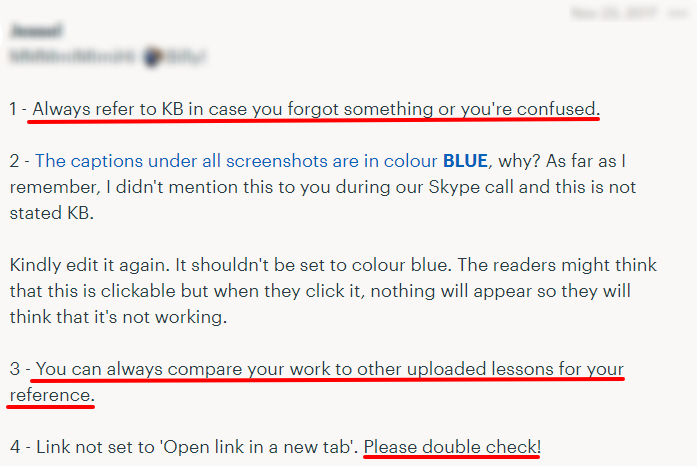
It’s easy to make a bad impression. Double-checking your work against the instructions when done will help you to make a brilliant first impression instead.
Even if you make some mistakes, it’s not the end of the world, of course, as you can see from our reactions below.
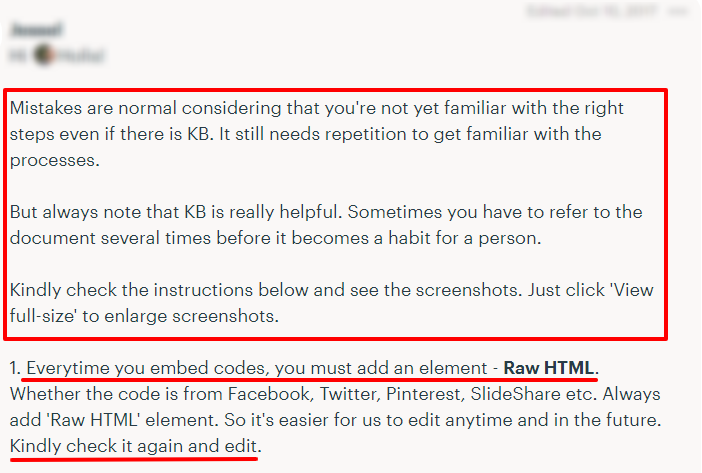
It’s natural to make mistakes at the start of your new career and you can learn a lot from them. As long as you do NOT repeat the same mistake over and over again during the whole trial period and come across as slack with your tasks.
If we don’t learn from our mistakes then we miss a huge opportunity… and yet many people fall into this trap.
Accuracy is extremely important no matter what job you have. If you mislead co-workers, your boss, your client because of mistakes then there can be repercussions.
In some circumstances accuracy is CRITICAL so you may find these 10 tips on how to get better and improve your accuracy helpful.
But, how do you know when your mistakes can be tolerated and when you’ve just crossed the line? Let’s say a few words about it.
How Long Can Your Mistakes Be Tolerated?
There is usually a honeymoon period or a trial period when starting a new job. All employers know that you’re new to the job and need time to learn the new systems and tasks.
The big question is – how long is the honeymoon period?
Well, it depends…
It’s only as long as the employer’s patience with the new employee. When the employer runs out of patience with many mistakes and stupid questions then it’s likely the employee will be ‘let go’.
It’s critical for you to realise that this patience runs out faster if you don’t read the instructions. As simple as that.
When the trial period ends, employers often ask their team members for feedback when deciding whether to keep the new employee or not. That was the case in our team, too.

Feel free to take a sneak peek at a couple of responses:
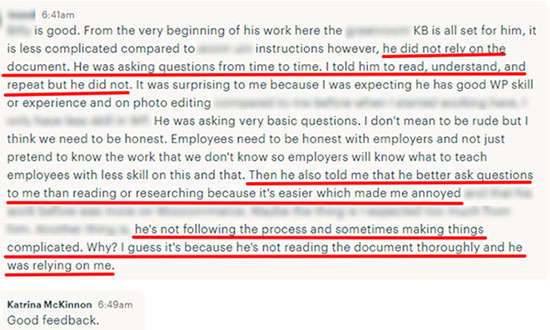
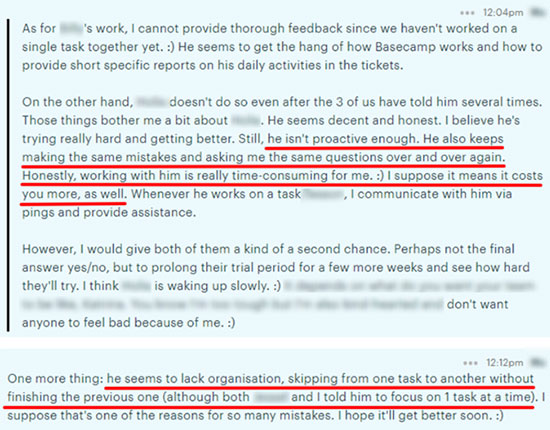
What do you think happened with the two of our new colleagues? Did they become mindful and more attentive so that they could keep their jobs?
Well, one of them actually did change his attitude to work and has become a successful and valuable member of our team. It’s been a real pleasure to work with him since then. Actually, he’s among the most productive people in the team.
Unfortunately, the other one didn’t choose to follow the same path although he is also a great guy. Should we really say how that relationship ended?
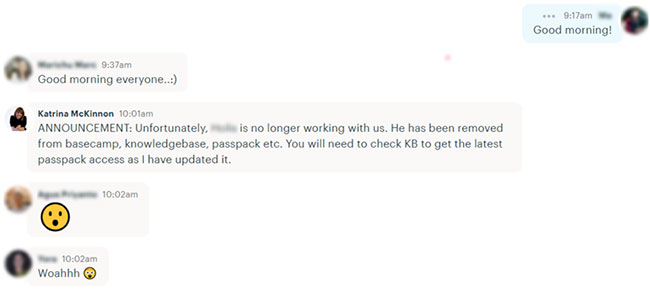
The rest is history now.
You see how it goes?
Remember – it’s totally up to YOU to decide which of these two cases will be yours in your future employment. Got it?
Nice. Having read this lesson, you’re armed with the necessary knowledge to play it smart from the start of your new online work. Don’t miss a fantastic job opportunity just because you lack proper attention. Be meticulous and keep calm. OK?
Now when you’ve learnt why reading the instructions thoroughly is so critical, it’s time to recap the main points.
In Summary
What we tried to teach you in this lesson seems so obvious to those who perhaps have more experience and maturity.
However, a lot of our students who are starting a new career are young and inexperienced. That’s why we decided to reassure all of you that it’s okay to slow down, be careful and read the instructions.
From personal experience, the long-term people in our team are very good at reading instructions and asking intelligent questions that extend an idea.
You see the whole point?
Calm down and carefully read ALL the instructions and how-to guides showing you how to complete tasks and use various online business’ systems and processes.
Do NOT let your attention wander while reading. Be mindful. In other words, tend to be fully present, aware of what you’re doing, and not overly reactive or overwhelmed by what’s going on around you. As a result, you’ll be able to concentrate on your work better, reduce stress and improve your memory.
It will bring enormous benefits to your online career.
Be specific, straightforward and proactive if you need help. That’s how you’ll avoid asking dumb questions, as well as wasting your teammates and employer’s precious time and energy. It’s a way of showing respect to your co-workers, too.
Remember – it’s a busy world and everyone’s got many to-dos on their plate.
Moreover, this approach will undoubtedly make you a No.1 candidate for long-term employment within every serious online team. And that’s a jumping-off point for a prosperous online career.
Now, show us you got it!
Frequently Asked Questions
1. Why some newbies to online work underestimate the power of reading the instructions and guidelines they get when they join their new remote team?
a. Most of them do it unconsciously because they’re overexcited and nervous about their new career so they cannot settle down and pay attention to details
b. They all think they know everything or they’re too lazy to read the instructions thoroughly
2. How will your employer and teammates know that you’re not reading the instructions thoroughly?
a. They will probably use some fancy software to spy on you
b. You’ll probably ask dumb questions and make stupid mistakes even though you’ll have access to and be expected to go through all the links with detailed instructions where tasks and processes are explained to you
3. What are the possible consequences of not reading your instructions carefully?
a. Wasting other team members’ time and energy by bothering them with your stupid questions and asking them explain things to you over and over again instead of simply reading the guidelines you’ve got
b. Making numerous mistakes and possibly not getting paid for the poor work you’ve done
c. Losing your job if you don’t change the attitude to work asap
d. All of the above, depending on your employer and team
4. When you’re new to a remote team, you’d better avoid asking any questions because you could come across as ignorant.
a. True. Asking a lot of questions just reveals that you don’t know how to get the job done
b. False. When you struggle with a task and you cannot find a solution on your own, you should always ask for help. Just address the right person and be as precise as possible
5. What’s the next logical step to take when you’ve completed a task assigned to you?
a. Carefully go over your work and double-check every detail before you let the others know you’ve finished
b. Submit your work to the person who assigned it to you as soon as possible without checking it to prove how fast you are
c. Ask another trustworthy and responsible teammate who has nothing to do with that task or project to check and correct your work instead of you so that you don’t make a bad impression on the others
6. What’s the difference between intelligent and dumb questions?
a. There are no dumb questions at work
b. There’s absolutely no difference between these two types of questions
c. Intelligent questions are specific, concise and to-the-point, respecting others’ time and showing how proactive you are. On the other hand, dumb questions are too general, annoying and request a lot of repetition from the other person. They’re usually those to which you can find an answer yourself if you’re not lazy or uninterested
7. Jan works in her organisation’s shipping department. She’s a great team player, but she often multitasks, which means that she sometimes enters customer addresses into the database incorrectly. As a result, the company has delivered a number of shipments to the wrong location. Which of the following statements is true?
a. This was sloppy, which cost money and damaged her organisation’s credibility
b. Jan’s a highly productive and meticulous member of her team
c. Jan always carefully double-checks her work
